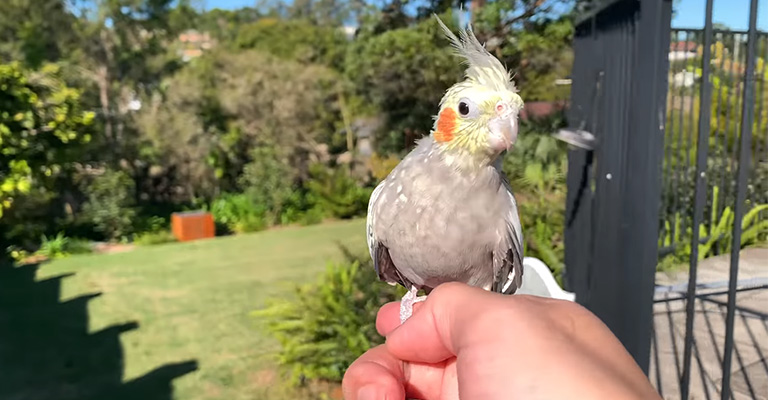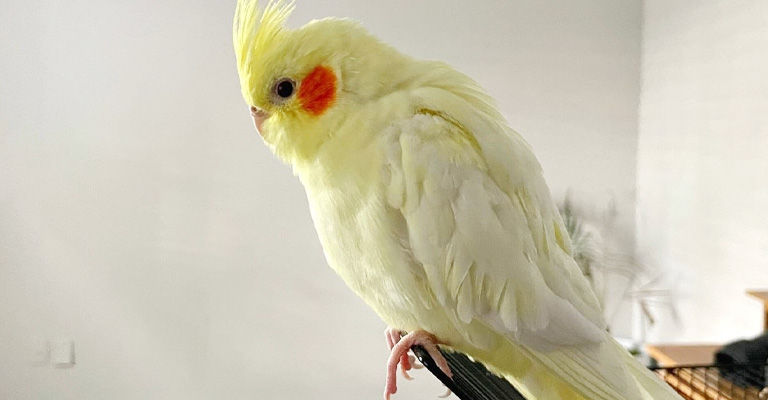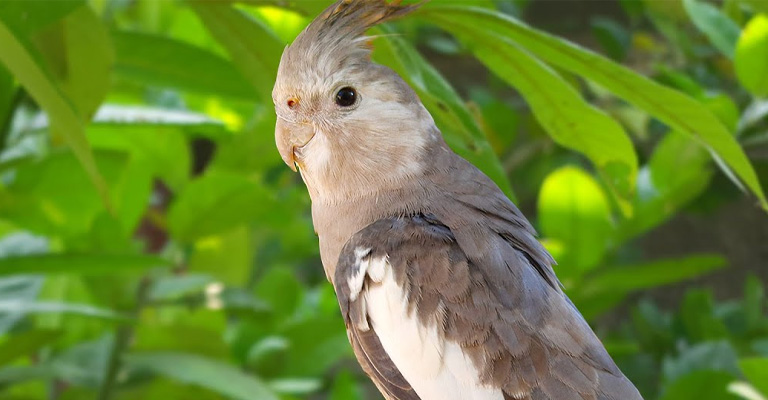The strong bond between humans and their pet cockatiels is a source of immense joy and companionship. Cockatiels, with their endearing personalities and sociable nature, often become cherished members of the family.
Yet, when the time comes for a vacation or an extended absence, pet owners may wonder, “Does my cockatiel remember me after vacation?” This question is a testament to the deep connection we share with our feathered friends.
During your absence, your cockatiel’s memory and emotional attachment to you come into focus.
It’s natural to be curious about how these intelligent and social birds react to your return. In this exploration, we will delve into the signs that indicate whether your cockatiel remembers you and the significance of these signs in the context of your relationship.
Understanding your cockatiel’s capacity for memory and affection can help you nurture and strengthen your bond upon your return.

Does My Cockatiel Remember Me After Vacation?
They are very intelligent and social birds that can form strong bonds with their owners.
Here are the signs that your cockatiel remembers you after a vacation:
It Greets You With A Happy Song Or A Whistle
Cockatiels are vocal birds that can learn to mimic sounds and words. They often use their voice to express their emotions and communicate with their flock.
If your cockatiel sings or whistles when it sees you, it means it is happy to see you and recognizes you as a friend.
It Flaps Its Wings Excitedly Or Shakes Its Tail
Cockatiels also use body language to show their feelings. When they are happy and content, they may flap their wings or shake their tail feathers. This is a way of releasing energy and showing enthusiasm.
It Preens Your Hair Or Clothes
Cockatiels are very affectionate birds that like to groom themselves and their mates. They use their beaks to clean and arrange their feathers, and sometimes, they do the same for their owners.
If your cockatiel preens your hair or clothes, it means it trusts you and considers you as part of its flock.
It Regurgitates Food For You
This may sound gross, but it is actually a sign of love and loyalty from your cockatiel.
In the wild, cockatiels regurgitate food for their mates and chicks as a way of sharing and caring. If your cockatiel does this for you, it means it thinks of you as its mate and wants to feed you.
It Cuddles With You Or Naps On Your Shoulder
Cockatiels are very social birds that need companionship and warmth. They often cuddle with each other or sleep in groups to feel safe and comfortable.
If your cockatiel cuddles with you or naps on your shoulder, it means it feels relaxed and secure with you.
It Nibbles Your Ear Or Finger Gently
Cockatiels are curious birds that like to explore their surroundings with their beaks. They also use their beaks to show affection and playfulness.
If your cockatiel nibbles your ear or finger gently, it means it is curious about you and wants to interact with you.
It Responds To Your Voice Or Name
Cockatiels have excellent memories that allow them to recognize the faces and voices of their owners even after months of being separated.
They can also learn to associate sounds and words with specific people or things. If your cockatiel responds to your voice or name, it means it remembers you and knows who you are.
It Displays Its Crest Or Wings Proudly
Cockatiels have a crest on top of their head that they can raise or lower depending on their mood. They also have colorful wings that they can spread or fold as a way of expressing themselves.
If your cockatiel displays its crest or wings proudly when it sees you, it means it is confident and happy with you.
It Follows You Around Or Flies To You When Called
Cockatiels are very loyal birds that like to stay close to their flock members. They often follow their owners around the house or fly to them when called.
If your cockatiel does this, it means it is attached to you and wants to be with you.
How Much Do Cockatiels Bond With Their Owners?

Cockatiels are known for their strong ability to bond with their owners, forming close and affectionate relationships.
Here are the reasons why cockatiels bond so well with their human caregivers:
Social Nature
Cockatiels are inherently social birds that thrive on companionship. In the wild, they often form tight-knit flocks, and when they are raised in captivity, they see their human owners as part of their flock.
This natural inclination toward social interaction makes it easier for them to bond with humans.
Intelligence
Cockatiels are intelligent birds that can learn and remember a wide range of behaviors, commands, and interactions.
This intelligence enables them to recognize and form strong bonds with the people who care for them.
Vocalization
Cockatiels are excellent mimics and can learn to whistle tunes, say words, or even imitate sounds in their environment.
When they mimic their owner’s voice or sounds associated with them, it’s a sign of a strong bond and recognition.
Physical Affection
Cockatiels often display physical affection by preening their owners, nuzzling their faces, or snuggling against them. These gestures demonstrate trust and affection, reinforcing the bond.
Attachment to Routine
Cockatiels are creatures of habit and thrive on routine. When they become accustomed to daily interactions and activities with their owner, they form a strong attachment to that routine and to the person who provides it.
Trust Building
Building trust with a cockatiel takes time and patience. Owners who spend quality time with their birds, handle them gently, and provide positive reinforcement through treats and affection help cement the bond between them.
Emotional Connection
Cockatiels are highly sensitive birds and can pick up on their owner’s emotions. They respond positively to a caregiver’s love and attention, and this emotional connection strengthens their bond.
It’s important to note that the strength of the bond between a cockatiel and its owner can vary from bird to bird. Some cockatiels may bond more quickly and deeply than others, depending on their individual personalities and life experiences.
Building a strong bond with your cockatiel requires consistent care, attention, and respect for their needs, ensuring a healthy and happy relationship between you and your feathered friend.
What Do I Do To Make My Cocktail Remember Me After Vacation?

I’m happy to share some tips on how to make your cockatiel remember you after a vacation. Cockatiels are very smart and social birds that can form strong bonds with their owners, but they may need some time and patience to re-establish their trust and affection.
Here are some tips that may help you:
Be Consistent And Gentle
When you return from a vacation, try to resume your normal routine with your cockatiel as soon as possible.
Feed it, clean its cage, and spend time with it every day. Talk to it softly and calmly, using its name and words it knows. Avoid sudden movements or loud noises that may scare it.
Offer Treats And Toys
Cockatiels love to eat and play, so you can use treats and toys to reward and entertain them.
Offer them their favorite foods, such as fruits, vegetables, seeds, or millet, through the cage bars or on your hand. Give them new or familiar toys that they can chew, shred, or explore.
Let It Come Out Of The Cage
Cockatiels need exercise and stimulation, so you should let them out of the cage for at least an hour a day.
Make sure the room is safe and bird-proofed, and close the windows and doors. Let your cockatiel fly around, perch in different places, or play with you.
Teach It To Step Up
One of the most important skills to teach your cockatiel is to step up on your hand or finger.
This will make it easier to handle and bond with your bird. To teach it to step up, gently press your hand or finger against its chest and say, “Step up.” When it steps up, praise it and give it a treat. Repeat this until it does it willingly.
Pet And Scratch It
Cockatiels enjoy being petted and scratched on their head, neck, and cheeks. This is a sign of affection and trust from your bird.
To pet or scratch your cockatiel, use your finger or thumb to gently stroke or rub its feathers. Watch its body language and vocalizations to see if it likes it or not.
Sing Or Whistle To It
Cockatiels are very musical birds that can learn to mimic sounds and words. They often use their voice to express their emotions and communicate with their flock.
If you sing or whistle to your cockatiel, it may respond by singing or whistling back. This is a way of bonding and having fun with your bird.
Play Games With It
Cockatiels are very curious and playful birds that like to interact with their owners. You can play games with your cockatiel, such as peek-a-boo, fetch, hide-and-seek, or chase.
These games will stimulate your bird’s mind and body and make it more friendly and confident.
Train It To Do Tricks
Cockatiels are very intelligent birds that can learn to do tricks, such as waving, shaking hands, spinning, or ringing a bell.
You can train your cockatiel to do tricks by using positive reinforcement, such as treats, praise, or clicker training. This will challenge your bird’s brain and strengthen your bond.
Be Patient And Respectful
Cockatiels have different personalities and preferences, so you should respect your bird’s individuality and pace.
Some cockatiels may be more shy or timid than others, so you should not force them to do anything they don’t want to do. Be patient and gentle with your cockatiel, and don’t give up on it.
FAQ
Yes, cockatiels have the ability to remember their human owners after a vacation. They often display signs of recognition, such as vocal greetings, physical affection, and trust-building behaviors when their owners return.
The time it takes for a cockatiel to recognize you after a vacation can vary, but it often happens fairly quickly. Some birds may immediately show signs of recognition, while others may take a few hours or days to readjust and display affection.
Cockatiels have good long-term memory, so they are less likely to forget their owners, even during extended absences like vacations. However, maintaining their bond through regular interaction and care is essential to ensuring a strong connection.
To strengthen the bond with your cockatiel after a vacation, spend quality time together, offer favorite treats, engage in play, and maintain a consistent routine. This reassures your bird of your presence and affection.
It’s possible to maintain your cockatiel’s bond with you when leaving them with a trusted friend or pet sitter. Provide detailed care instructions, familiar items, and contact information to ensure your bird feels safe and secure in your absence.
Conclusion
In the realm of pet ownership, the question of whether your cockatiel remembers you after a vacation highlights the profound connection that can exist between humans and their avian companions.
As we’ve discovered, there are several compelling signs that suggest cockatiels do, indeed, remember their owners and the special bond they share.
From vocal greetings and physical affection to trust-building behaviors and emotional connections, these intelligent and social birds can express their recognition and affection in numerous ways.
While individual cockatiel personalities and experiences may vary, the general consensus is that they have the capacity to form lasting memories of their human caregivers.
The depth of your cockatiel’s memory and the strength of your bond depend on your interactions, care, and the time you invest in nurturing the relationship.